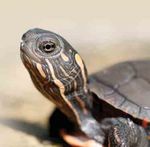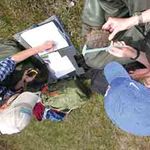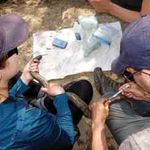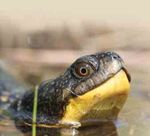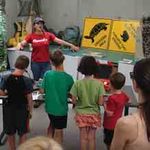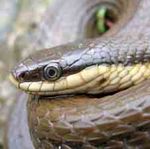Request for Funding Support - Southern Ontario At Risk Reptiles (SOARR)
←
→
Page content transcription
If your browser does not render page correctly, please read the page content below
Southern Ontario At Risk Reptiles (SOARR):
Request for
Funding Support
Southern Ontario At Risk Reptiles (SOARR) is a grassroots program that
has grown to international importance, setting the bar for research and
recovery of reptiles in Canada. We have developed a program that, for Spotted
p Turtle
almost 30 years, has been a safeguard in preventing local extinctions of
at-risk wildlife and helped species at risk across their ranges.
Funding needs be secured to carry out this important work. We are
asking for your help in partnering with us to save our local Ontario
species at risk, allowing us to take important steps toward the long-term
survival of populations provincially, nationally, and internationally.
Blanding’s Turtle
SOARR has unmatched experience and expertise and a proven track
record, but the program needs secure financial backing to be sustainable.
All contributions are tax deductible, and will ensure we can continue with
this important work into the future. Through funding from community
members, businesses, and others who are passionate about our natural
world, we can ensure the survival of these remarkable, but often
overlooked, denizens of Southern Ontario’s wetlands, rivers, grasslands,
and forests.Eastern Hog-nosed Snake
What is SOARR?
SOARR is one of the longest running and most
successful reptile research and recovery programs in
Canada. Initiated in 1994 to assess the status of the
rapidly declining Spiny Softshell Turtle in southern
Ontario, this program has since evolved to serve as a
nationally and internationally recognized conservation
program for a host of Threatened and Endangered
reptiles across many habitat types.
Although our program focuses on southwestern
Ontario, its impact is globally important. We work with
some of the largest known populations of at-risk
reptiles in North America, and thus our activities are
necessary at an international level. We carry out much
of our work throughout the Thames River watershed
and along Lake Erie’s rare coastal wetlands in
southwestern Ontario. We also partner with various
projects throughout many other areas of Ontario. This
allows us a unique opportunity to affect change for a
large number of species, their habitats and for the
many communities along the way.
Northern Map Turtle Queensnake
Our Program
Our activities are based on peer-reviewed recovery needs for each species:
• We study and initiate recovery efforts for the largest remaining population of Spiny Softshell Turtle (Endangered) in Canada.
Our extensive nest protection and habitat creation efforts have dramatically slowed the decline of this species along the
Thames River, and have created new hope for the survival of this turtle in Canada.
• We have located, marked, and assessed the largest known populations of Spotted Turtle (Endangered) and Blanding’s Turtle
(Endangered) in Canada, and continue to enact measures to safeguard these globally important populations and their heavily
impacted habitats.
• We carry out long-term research and habitat stewardship work on a number at-risk reptile species, including Queensnake
(Endangered) and Eastern Hog-nosed Snake (Threatened). These harmless snakes have experienced unprecedented declines
over the past few decades, due primarily to human-related threats. The Queensnake in particular is of great conservation
concern due to its extremely low numbers in the province.
• In addition to research on various species, we also locate and artificially incubate thousands of turtle eggs from across
southwestern Ontario, including Spiny Softshell, Northern Map, Blanding’s, Snapping, and Midland Painted Turtles. Since all
of Ontario’s turtles are at some degree of risk, this large-scale effort is necessary to slow declines of all species.
• We partner with many groups and individuals, and have built working relationships with other Conservation Authorities,
Salthaven Wildlife Rehabilitation and Education Centre, Thames Talbot Land Trust, Ontario Nature, local First Nations, various
community members, and many others to ensure we have the greatest reach possible.
• We have provided education and awareness presentations to tens of thousands of students, community members, and
scientists, as well as reached hundreds of thousands of individuals through regional, provincial, and national news outlets.
We unite communities in efforts to protect species in their own backyards, building capacity for long-term change and
supporting local champions.
• We take on students, early career biologists, and community members, providing experience to these individuals for their
future careers and the future of our environment.
• We work with scientists, governments, NGOs, planners, land managers, educators, and others to ensure the information we
collect is used to provide positive and lasting change for species at risk.
Blanding’s TurtleSOARR’s Leader
Scott Gillingwater, Species At Risk Biologist, has been with the
SOARR program since its inception in 1994. Since taking over as
project leader in 2000, Scott has continued to build this program
into what it is today, and is known Canada-wide for his innovative
approaches to wildlife research and recovery.
Scott is, or has been, a member of multiple reptile and
ecosystem-based recovery teams, the Committee On the Status of
Endangered Wildlife In Canada (COSEWIC) Amphibians and
Reptiles Specialist Subcommittee, the Committee On the Status of
Species At Risk in Ontario (COSSARO), and the IUCN Tortoise and
Freshwater Turtle Specialist Group. He is a co-founder of the Long
Point Causeway Improvement Project, past Chair of the Spiny
Softshell Turtle and Queensnake Recovery Teams, former
President of the Canadian Herpetological Society, and is currently
the Associate Editor for the journal Herpetological Conservation
and Biology, among others. Scott has been awarded the W.H.H.
Snapping Turtle Gunn Conservation Award, the Nature London Conservation
Award, the CHS E.B.S. Logier Communications Award, the A.D.
Latornell Conservation Pioneer Award, and Envir ronme
Environment
Canada’s Environmental Citizenship Award for his
h long-term
lon
work with reptiles at risk.
Spiny Softshell Hatchling
The Time is Now
Species recovery isn’t quick, and long term funding is
unpredictable or not available at all. In order to carry out our
efforts, we need your help. We are at a crossroads -- we have
built the foundation and our successes can speak for
themselves, but the next 10 years are vitally important. Turtles
especially take many years to reach maturity, so we need to
continue these efforts until hatchlings we’ve released begin to
mature, start to nest on their own, and can sustain naturally
viable populations. We hope that you will work with us to
protect, recover, and ensure healthy populations into the future.What You can Expect
Your tax-deductible donation will immediately impact wildlife in your own region. Larger contributions, as well as
contributions sustained over time, will have the most impact, allowing us to plan into the future and create long-term
change.
You will be part of a program that is making tangible change and helping species in decline. You will receive updates
and, with your permission, we will publicly highlight your generous contributions.
Please help us ensure these animals remain in Ontario, to support a healthy ecosystem and ensure the next
generation of people will be able to appreciate the natural diversity that our province has to offer.
Donations can be made two ways:
1. Online at www.thamesriverdonations.ca/species-at-risk
We’ll email you a tax-deductible receipt.
2. Cheque made payable to Upper Thames River
Conservation Authority (Species At Risk program) and
mailed to:
UTRCA
1424 Clarke Road,
London, Ontario, Canada
N5V 5B9
Please enclose a note to indicate your donation is
for the Reptiles At Risk Program and provide your
name and mailing address so we can send you a
tax-deductible receipt.
Midland Painted Turtle
For more information about SOARR or to
discuss your donation, please contact
Scott Gillingwater,
Species At Risk Biologist
gillingwaters@thamesriver.on.ca
519-451-2800 ext.236You can also read




